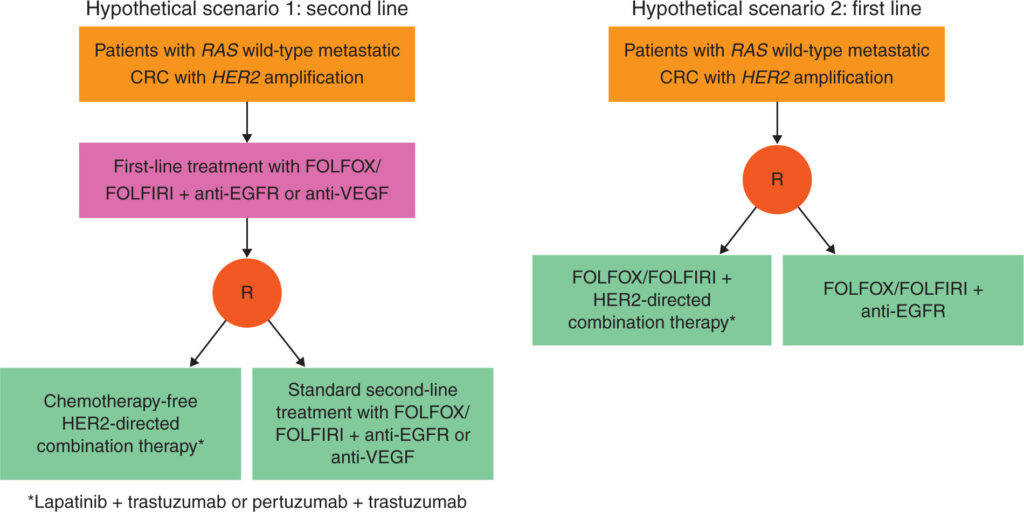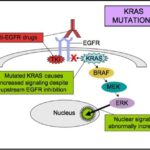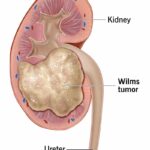Colorectal cancer (CRC) is a biologically diverse malignancy characterized by distinct molecular profiles. One such molecular subtype includes tumors that are wild-type RAS (lacking mutations in KRAS and NRAS) and HER2-positive, representing a unique and actionable subgroup.
HER2 (human epidermal growth factor receptor 2) overexpression or amplification, traditionally associated with breast and gastric cancers, has been identified in 3–5% of metastatic colorectal cancer (mCRC) cases. The co-occurrence of HER2 positivity in RAS wild-type tumors holds clinical significance, as these tumors may be resistant to EGFR inhibitors but responsive to HER2-targeted therapy.

Molecular Profiling: Identifying the Wild-Type RAS, HER2-Positive Subtype
Comprehensive molecular profiling is crucial for identifying patients eligible for HER2-directed therapy. Tumors are considered HER2-positive when they demonstrate:
- HER2 gene amplification (detected by fluorescence in situ hybridization, FISH)
- HER2 overexpression (determined by immunohistochemistry, IHC)
Wild-type RAS status is established through next-generation sequencing (NGS) or polymerase chain reaction (PCR)-based assays that confirm the absence of activating mutations in KRAS and NRAS genes. HER2 positivity is nearly exclusive to left-sided tumors and is enriched in microsatellite stable (MSS) cases.
Therapeutic Implications of HER2 Amplification in Wild-Type RAS mCRC
HER2 amplification confers resistance to anti-EGFR monoclonal antibodies such as cetuximab and panitumumab. However, it creates a therapeutic opportunity through dual HER2 blockade.
Key Therapeutic Strategies:
| Therapy | Agents Involved | Mechanism |
|---|---|---|
| Dual HER2 Blockade | Trastuzumab + Lapatinib | mAb + TKI targeting HER2 |
| Antibody-Drug Conjugates (ADC) | Trastuzumab Deruxtecan (T-DXd) | Delivers cytotoxic agent to HER2-expressing cells |
| Combination Targeted Therapy | Pertuzumab + Trastuzumab | Dual extracellular domain inhibition |
| EGFR + HER2 Dual Inhibition (limited) | Panitumumab + Trastuzumab (investigational) | Overcomes resistance mechanisms |
Clinical Trials and Evidence Supporting HER2-Targeted Therapies
HERACLES Trial (Phase II)
- Population: RAS wild-type, HER2-amplified mCRC
- Intervention: Trastuzumab + Lapatinib
- Outcome: ORR of 30%, with durable responses
- Conclusion: Dual HER2 blockade is effective post-EGFR therapy resistance
MyPathway Basket Trial
- Agents: Trastuzumab + Pertuzumab
- Results: 32% ORR in HER2-positive mCRC patients
- Significance: HER2-directed therapies are active outside breast/gastric cancers
DESTINY-CRC01 Trial
- Intervention: Trastuzumab Deruxtecan (T-DXd)
- Results: 45.3% ORR in HER2-positive, RAS wild-type mCRC
- Advantage: Bystander effect enhances tumor cell kill, even in heterogeneous HER2 expression
Mechanisms of Resistance to HER2-Directed Therapies
Resistance to HER2-targeted agents can emerge through various mechanisms, including:
- HER2 mutations altering drug binding sites
- PI3K/AKT/mTOR pathway activation
- Loss of HER2 amplification during treatment
- Tumor heterogeneity leading to subclonal escape
These resistance factors underscore the need for repeat molecular testing at progression and support combination or sequential therapies.
HER2 Testing Recommendations in Wild-Type RAS CRC
- When to Test: At the time of metastatic diagnosis or recurrence
- Testing Methods:
- IHC for protein overexpression
- FISH or NGS for gene amplification
- Scoring Criteria (IHC):
- 3+: Positive
- 2+: Equivocal, confirm with FISH
- 0–1+: Negative
- Sample Type: Formalin-fixed, paraffin-embedded tissue from primary or metastatic site
Clinical Management Pathway
- Initial assessment of KRAS/NRAS/BRAF and MSI status
- Confirm HER2 status in RAS/BRAF wild-type cases
- Stratify therapy:
- Anti-HER2 therapy for HER2-positive
- EGFR inhibitors for HER2-negative, RAS wild-type
- Monitor response with imaging and repeat biopsy at progression
Future Perspectives and Emerging Therapies
As the understanding of HER2 biology in colorectal cancer expands, novel agents and strategies are under investigation:
- Bispecific antibodies targeting HER2 and immune cells
- Combination immunotherapy with HER2-targeted agents
- HER3 and EGFR co-targeting to prevent resistance
- Liquid biopsy-based monitoring to track HER2 status dynamically
Wild-type RAS, HER2-positive colorectal cancer represents a molecularly distinct and clinically actionable subtype. Identification through rigorous molecular profiling and timely HER2 testing allows for the implementation of targeted therapies that can significantly improve outcomes. Ongoing clinical trials and precision medicine advances are poised to further refine treatment paradigms for this aggressive yet targetable CRC subtype.

